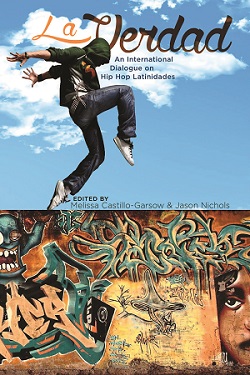“[Replaying Marc Anthony] is an example of how personal, critical reflection works as research and can be embraced in scholarly publications....This work is a valuable contribution for scholars and students in ethnomusicology, musicology, communication studies, and studies of rhetoric.” —Triauna Carey, Critical Studies in Media Communication
“Aparicio builds cultural bridges across the diasporas of the Americas, offering readers new methods of interpretations for voices that go unnoticed and/or unheard. Replaying Marc Anthony will serve as a model to other authors who write on the relationship between song and identity politics.” —Jacqueline Avila, author of Cinesonidos: Film Music and National Identity during Mexico’s Época de Oro
“Aparicio makes a case for pop music studies to be taken seriously as a form of politics, linking Anthony’s songs to broader issues within Latinx and Puerto Rican studies—homeland and diaspora, gender and racial politics, cultural links between Latinxs and other groups, and more.” —Petra Rivera-Rideau, author of Remixing Reggaetón: The Cultural Politics of Race in Puerto Rico
Replaying Marc Anthony is the first book-length study of Marc Anthony’s cultural, aesthetic, and political contributions to Latinx popular music and Latinx communities. Despite the trivializing label of “Latino pop,” Anthony’s repertoire has had a tremendous impact on his audience, particularly within the US Latinx community. Considering his music outside of limiting frameworks imposed by the music industry, Frances R. Aparicio situates Anthony’s songs within specific musical genealogies and histories, demonstrating that his songs not only foster healing from colonial violence but also produce, textually and sonically, multiple identities that resonate with his listeners. Relistening to five of Anthony’s most canonical songs—“Preciosa,” “Hasta Que Te Conocí,” “I Need to Know,” “Aguanile,” and “Vivir Mi Vida”—Aparicio traces the circulation of these sonic texts, examining their social, cultural, gender, and political meanings. Among the myriad topics Marc Anthony’s music critically reflects on are Puerto Rican and Diasporican itinerant subjectivities, Blackness, environmental crises, MexiRican sonic exchanges, Latinidad, masculinities, struggles with belonging as an “American,” and Global South solidarities.

Frances R. Aparicio is Professor Emerita in the Department of Spanish and Portuguese at Northwestern University. She is the author of Negotiating Latinidad: Intralatina/o Lives in Chicago and Listening to Salsa: Gender, Latin Popular Music, and Puerto Rican Cultures, among other books, and coeditor of various critical anthologies.
Contents
List of Illustrations
Introduction The Singer as Listener
Chapter 1 “Preciosa” (1998): Diasporican Subjectivities and the Sounds of Itinerancy
Chapter 2 “Hasta Que Te Conocí” (1993): Latinidad as Suffering
Chapter 3 “I Need to Know” (1999): Singing in English and the Sonic Struggles for Americanness
Chapter 4 “Aguanile” (2007): Critical Listening, Mourning, and Decolonial Healing
Chapter 5 “Vivir Mi Vida” (2013): Toward a Critical Salsa Romántica and a Global South Brownness
Coda Listening as Struggle
Acknowledgments
References
Index
Related Titles:

La Verdad
An International Dialogue on Hip Hop Latinidades
Edited by Melissa Castillo-Garsow and Jason Nichols

Sponsored Migration
The State and Puerto Rican Postwar Migration to the United States
Edgardo Meléndez


